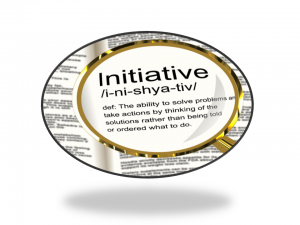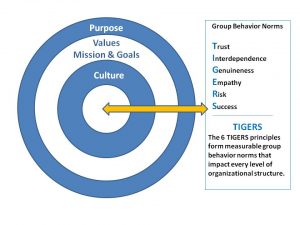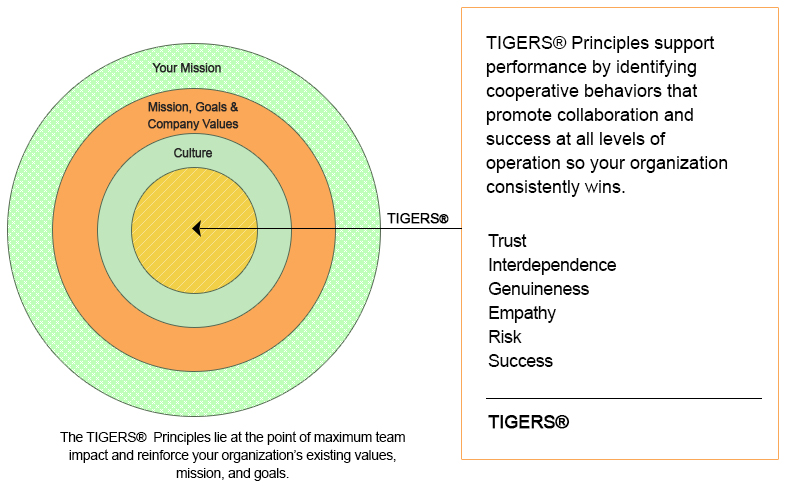 You suspect employee turnover is due to poor workforce behavior. Now what?
You suspect employee turnover is due to poor workforce behavior. Now what?
The good news is that workforce behavior lies at the root cause of many “problems” that reduce your bottom line. A strategic way to improve workforce behavior is through measurement and training.
Why measuring workforce behavior matters.
In 1987, I asked a question. That question was, “What is necessary to develop an ethical, quality-focused, productive and cooperative work group or organization?” I studied all the research available in Education, Psychology and Business. Out of this study six principles emerged. They are trust, interdependence, genuineness, empathy, risk and success. They form the acronym, TIGERS®.
 The next questions were, “Is this true? Can the TIGERS 6 Principles™ be individually isolated in group behavior?”
The next questions were, “Is this true? Can the TIGERS 6 Principles™ be individually isolated in group behavior?”
Four years later and after two Independently evaluated studies, the results were conclusive. Not only could each of the six principles be measured, they illuminated the problem(s) in group behavior either by their level of development or omission.
The TIGERS 6 Principles™ also prescribe what workforce development attention and training is required to transform an adequate work group into one that was exceptional. This meant that the return on investment for soft skill training could be also be measured against cost savings and productivity improvements in an organization’s bottom line.
Therefore, the first step is measuring the quality of six universal principles in organization and department behavior. The findings provide sharp focus for workforce development direction.
The benefit of sharp focus in workforce behavior.
Without sharp focus, you end up with a buckshot approach to workforce behavior improvement that may or may not hit the target. For example, let’s say you learned in employee exit interviews that internal bickering is the reason why employees leave.
You provide conflict resolution training. Nothing changes. Why?
Bickering often results from people not trusting one another. It also emerges from power struggles and other reasons. Lacking focus, bickering continues because the underlying behavior problems weren’t resolved.
Train for workforce behavior improvement.
Once you know the root cause workforce behavior issues, what training method is most effective?
It is known that training for behavior improvement is not sustainably successful in full-day or multi full-day training. There are some reasons for this.
First changing workforce behavior requires behavior change. That’s obvious. Filling the gap between where employees’ behavior is now to future improvement happens in a series of small incremental steps. These steps require practice and integrating new ways of doing things.
Second, one-time trainings do not produce long-lasting results. They are expensive and take a small number of employees away from their scheduled work. When employees return, work has piled up. They soon forget what was learned because they focus on catching up on work and fall back into old patterns of doing things.
 What’s an alternative for day-long training?
What’s an alternative for day-long training?
One well researched alternative to full day and multi-day workforce behavior training is mico-training that takes 10 minutes to learn, covers one idea, is practiced, discussed and coached to and is required of everyone. It comes through an inexpensive annual subscription and is worked into your unique workforce development initiatives.
There is a good reason why this is superior. Most people resist change until they learn how change makes them more successful. For example, sharing success stories during weekly meetings anchors learning and encourages resistant people to also desire success. No one wants to be left behind.
There is human development research that supports this. It is a pea eating story.
Peas were served to a group of children. Some kids loved them and other’s didn’t. However, as those who loved them talked about how wonderful they were and how much they enjoy them in mashed potatoes, by themselves with butter and eating raw, those who didn’t like them began to soften their resolved and began eating them too. After awhile, everyone in the group liked peas.
The takeaway is, no one wants to be left behind or be the odd person out.
Combine workforce behavior training and measurement.
The best workforce behavior micro-training is accessible anytime day or night. It can be accessed both through work stations and smart devices. It is also required of everyone. When everyone receives the same 10 minute training with emphasis on weekly practice and success stories that apply to your real work initiatives, improvement occurs incrementally and sometimes synergistically.
When you combine measurement with focused micro-training and see positive results in your bottom line, it gets exciting.
Measurement that compares one year’s progress with the next year and the next is also strategically valuable. Sometimes, behavior takes longer to transform and actually pays for itself though cost savings (turnover, rehiring, sick” days, scheduling hastles, overtime, risk management, etc.) and productivity improvements (cost effective goal accomplishment, more widgets produced, problem resolution, improved leadership success, succession leadership development, streamlining operations, etc).
Workforce behavior measurement and micro-training ares the responsible way to improve workforce behavior, train employees and improve leadership practice.
Care to dig deeper into this workforce behavior discussion?
The following resources add to this conversation.
- Rude Behavior Creates Toxic Work Cultures
- Fix Group Behavior Norms to Fix Employee Engagement Problems
- Stop Rude Team Behavior with TIGERS Group Norm Facilitation
- Download a sample TIGERS Workforce Behavioral Profile
Copyright, TIGERS Success Series, Inc. by Dianne Crampton
About TIGERS Success Series, Inc.
 TIGERS® Success Series provides a comprehensive, multi-pronged and robust system for improving both your work environment and profitability.
TIGERS® Success Series provides a comprehensive, multi-pronged and robust system for improving both your work environment and profitability.
We specialize in training your managers in group facilitation methods that build workforce cooperation and high performance team dynamics. Scaled to grow as your organization and leadership performance grows, our proprietary Team Behavior Profile, Management training workshops, and coach/consultant licensing are based on the six principles we have found to be the right mix to make this happen.
Collaborative Work Culture Consulting, Board Retreat Facilitation, Work Behavior Assessment and Micro-training Services located in Bend, Oregon. 541-385-7465